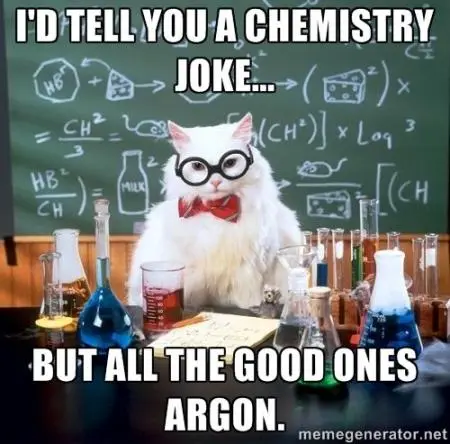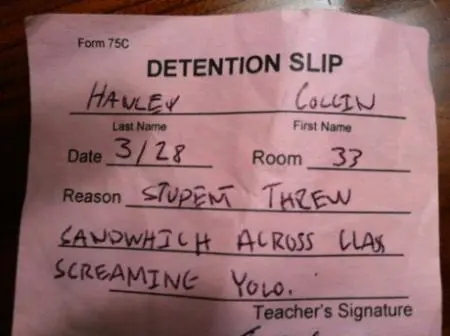Like all bad (and good) trends, there comes a point when people continue to use social media buzzwords long after the recommended expiration date. Here are a few that need to be cleaned out of the lexicographical fridge.
1. Bestie
What does it mean?
Bestie is short for “best friend” as in:
My 14-year-old cousin spends hours on her iPhone texting her bestie, Fran.
Why it should die:
This an example of a word that has come into our lexicon because it sounds cool and it fits more easily into the 140 character limit. Sure, it's a slightly shorter version of best friend, but it has become more popular than its immediate, and shorter, predecessor—BFF (textspeak for Best Friend Forever). It makes a bit more sense to say “my Bestie” than “my BFF”, but like so many fashion trends, most people perpetuate it because they think it makes them sound young. It's a pointless word, and if it doesn't die soon, it'll be like saying “bosom buddy.”
2. Frenemy
What does it mean?
A combination of “friend” and “enemy” applied to people who say they are friends but who really have it out for each other.
Why it should die:
You are either a friend or you're not a friend. And if you are an enemy, then you are a person who is actively hated by someone else. So a frenemy is someone who is actively hated by some two-faced jerkoff who is using a fake friendship with you for some sort of advantage. A person like that is just a straight-up enemy; there is no “friend” aspect at all. Dump this person. And if you have an enemy who you lie to, then you are a butthead and you need to be stopped. I object to this word because people have made it into a trendy word that serves as an excuse for treating your “friends” like crap. It's gone so far as to prompt an episode of This American Life. Stop saying it and stop doing it. Also, the word-combo thing is annoying—why do we need to Brangelina everything we say?
3. Meme
What does it mean?
According to Wikipedia, a meme is "an idea, behavior, or style that spreads from person to person within a culture." It comes from the Ancient Greek word mimeme which means “imitated thing.” The word meme is credited to Richard Dawkins' 1976 book The Selfish Gene “as a concept for discussion of evolutionary principles in explaining the spread of ideas and cultural phenomena. Examples of memes given in the book included melodies, catch-phrases, fashion, and the technology of building arches.”
Why it should die:
The funny thing is—and I haven't read Dawkins' book—that the word itself is a catch-phrase, a trend, a cultural phenomena that just keeps self-perpetuating like bunnies dumped in a park. Also, who is the a-hole who transferred it from the scientific argument about human behavior to an excuse to post 9 million videos on YouTube of people planking? Or Harlem shaking? Or Catbreading?
Even the word is annoying. Say it with me now—meme, meme, meme, meme, meme. It has such a whiny quality to it; I just want to smack it. Worse still is that it sounds so like a word that almost means the exact same thing—theme. Not ironically, most memes are nearly as annoying as the word itself—an endless copycatting of some topic that is usually inane to begin with. As usual, people think they are smart using this word: “Look Ma, I dredged up this word from ancient times!” Are we going to bring back togas next?
![]()
Photo via memegenerator.net.
4. Viral
What does it mean?
Viral means that some story or idea has suddenly gotten very, very popular—a video, for instance, of a kid biting another kid's finger that gets 70 gajillion views.
Why it should die:
It seems like this word should be entering its golden years anyway; it's been around long enough. While the metaphor it invokes is not a bad one—the concept of a story getting so popular that it spreads like mono at a make-out party—it's getting a bit staid now. I recently read an article about how the phrase “a canary in a coal mine” has worn out its welcome (a century later), and I hope that we aren't still saying viral in the year 2100.
What annoys me most about the word is how advertisers and marketers have glommed onto it as a strategy for selling us stuff. They plant links that are outrageous and “clickable” to lure us into watching some silly video or reading some incredible (as in—not believable) story, just to see how many of us take the bait. I just watched a PBS special about advertising call The Real Mad Men and Women of Madison Avenue, and in it there was a story of how a company turned the Charlie Bit Me video into an ad for Ragu pasta sauce. They wanted to capitalize on something that “went viral” in its own right to sell tomato sauce—hopefully a lot of tomato sauce.
5. Twee
What does it mean?
Twee is a description of something that is cute to the point of being sickening. Here it is used in a sentence:
What with their squeaky e-sounds and diminutive shortenings of perfectly good phrases, the words “bestie,” “selfie,” and “meme” are the most twee words on the internet.
Why it should die:
Granted, I see far fewer instances of this word polluting my internet than some of the others on this list, but I can't help but cringe when I do. To me, it seems hypocritical to even use this word. To utter twee is the BE TWEE. If you insist on perpetuating this word, you may as well cut your Zooey bangs and start a blog full of pictures of puppies in pink skull t-shirts.
6. Photobomb
What does it mean?
When someone or something appears in a photo that was intentionally taken of something or someone else. Its resurgence in our lexicon is, apparently, due to an old snapshot that made it on to the internet in 2012 of a stingray appearing to insert itself into a gaggle of women posing during a snorkleing trip.
Why it should die:
One, it's overdramatic. Someone making a terrible face in the midst of a bunch of smiling faces is not akin to a bomb. Sure, some of these are really, really funny, but it seems every time I log in to some social media platform, there is an article about hilarious photobombs—most of which appear to be staged. Two, it's probably fake. The stingray in the popular shot is actually being held up by someone, and while the surprise on the women's faces is real, the shot was a typical joke played by photographers on tourists.
Photobombs have been around as long as photos have, and only now we have a name for it?! Remember bunny ears? I guess it is an easy way to sum up what some might call a ruined photograph, but like almost every term on this list, it's just overused.
7. Selfie
What does it mean?
It's short for self-portrait, usually with a cell phone camera—in a bathroom mirror.
Why it should die:
Because it's NOTHING NEW. As long as there have been cameras (or paint, for that matter), there have been “selfies”. In fact, the internets are replete with people posting pictures of “original selfies” by Colin Powell and some chemist guy in 1839. Why we suddenly feel the need to shorten it to some cutesy word and pretend like we've invented the concept just because our phones have cameras built into the screen side now is beyond me. And then there is the fact that it was voted as a word of the year by Oxford Dictionaries. Really? REALLY REALLY? It seems like the culmination of me-culture. We are so self-centered that we had to reinvent a word for immortalizing ourselves. And like Narcissus, we fall in love with our image reflected back at us. Image if that pond had had a “post this to Facebook button.” We'd all be like “OMG, Narcy, I LOVE your haircut!”
Next it will be “footie,” a new word for snapping pictures of your feet—on the beach, with newly painted toenails, or pigeon-toed in a new pair of TOMS. Mark my words. It'll happen.
![]()
Pictured: Geraldo Rivera
8. #
What does it mean?
Known as the “hashtag,” this symbol, typically associated with meaning “number,” has been reinvented by social media as a way to link Tweets and Facebook posts together by tagging it with a theme. For instance, if you were to write a Tweet about the president, you might tag it #Obama so that it will be searchable with other Tweets about POTUS.
Why it should die:
You people just can't seem to control yourselves. Reading almost any Facebook post or Tweet these days is like reading a series of asides and inside jokes that are not at all meant to connect one person's post with another. Instead, they are meant to convey something clever or ironic or, let's face it, OBVIOUS. I admit, I was originally a fan of the alternate usage—heres my 2010 article on my blog about them and my article for LitReactor on Hashtag Haiku from 2011.
But lately, I cringe every time I see some status update with a long series of hashtagged comments after it that cover everything from redundancy to irony to cliches. For example: “Just got off the plane in Miami. #beach #bienvenidoaMiami #tantime #nomorewhitelegs #travellady #wheresmyluggage #newbikini”
It reads like 7 elbow nudges to the ribs. Are you really trying to link this message with other people out there needlessly quoting that craptacular '90s hit from Will Smith? I doubt it. Like all things trendy, when they are overdone, they appear desperate. A couple well-timed hashtagged comments are OK, but keep it minimal and deliberate. Otherwise you just look like a buck-naked, barely-legal, Disney has-been riding a wrecking ball. #lookatme
9. Because____
What does it mean?
“Because ____” is a shortened way of expressing causality. Instead of saying “I was late to work today because the roads were snowy.” you say, “I was late to work today because snow.”
Why it should die:
This particular trending phrase should die because it hasn't quite reached the obnoxious levels of “meme” and “viral” and I don't want it to. Sure it was funny at first—sometime around early 2013—but it's already blow through the honeymoon period. By late 2013, we started arguing about its grammatical legitimacy—which, let's face it—sucked the humor right out of it. It's like your Grandpa emerging from an epic visit to the bathroom and exclaiming “Because prune juice!” Ok, that might be funny if it actually happened, but otherwise it's a joke over-explained, so let's just let this one die an early death before it get out of hand.
![]()
Picture via The Grumpy Giraffe.
10. YOLO
What does it mean?
It an acronym for “You Only Live Once.” This appears often in pictures or captions of pictures of people about to do (or having just finished doing) something brave/scary/cool/fun/stupid/crazy. For example, the snapshot of a person about to skydive for the first (and maybe last) time might have the caption “YOLO.”
Why it should die:
Because duh. (I know, I know...). Beside the Captain Obvious-ness of the phrase in general, it comes off as braggadocio. Then there is the potential tragic irony implied. Sure, you only live once, and if you don't survive this base jumping stunt you are about to attempt, you only die once, too. If you're gonna do something that compels you to exclaim “YOLO!!” as you throw yourself off a perfectly good bridge, maybe you need to rethink how you are living. Dumbass.
Other words that we ought to bury:
mashups, uber, lol, hipster, buzzword, green...What social media buzz words are on your kill list?

About the author
Taylor Houston is a genuine Word Nerd living in Portland, OR where she works as a technical writer for an engineering firm and volunteers on the planning committee for Wordstock, a local organization dedicated to writing education.
She holds a degree in Creative Writing and Spanish from Hamilton College in Clinton, NY. In the English graduate program at Penn State, she taught college composition courses and hosted a poetry club for a group of high school writers.
While living in Seattle, Taylor started and taught a free writing class called Writer’s Cramp (see the website). She has also taught middle school Language Arts & Spanish, tutored college students, and mentored at several Seattle writing establishments such as Richard Hugo House. She’s presented on panels at Associated Writing Programs Conference and the Pennsylvania College English Conference and led writing groups in New York, Pennsylvania, and Colorado for writers of all ages & abilities. She loves to read, write, teach & debate the Oxford Comma with anyone who will stand still long enough.











